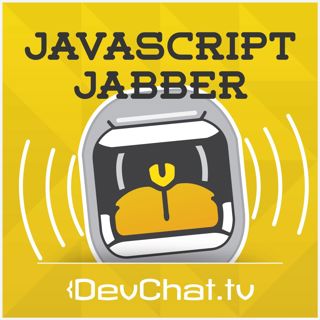
Beyond Aesthetics: What the Next Generation of Frameworks Should Offer - JsJ_670
In this episode of JavaScript Jabber, our host Charles Max Wood, panelist Dan Shappir, and special guest Yoav Abrahami, CTO of Wix Enterprise, engage in a fascinating discussion on the evolving landsc...
6 Maalis 20251h 15min

A Guide to AI Models: From Tokenization to Neural Networks with Ishaan Anand - JsJ_669
In this enlightening episode of JavaScript Jabber, hosted by Charles Max Wood and Steve Edwards, panelist AJ O'Neil is joined by guest Ishaan Anand to delve deep into the intricacies of AI and large l...
21 Helmi 20251h 38min

Exploring ReactScan: Aiden Bai's Tool for Identifying React Performance Issues - JsJ 668
In this episode of JavaScript Jabber, panelist Dan Shappir sits down with guest Aden Bai to delve into the nuances of React performance. Broadcasting from Tel Aviv, Dan welcomes Aden, who is based in ...
13 Helmi 20251h 7min

TanStack: A Deep Dive into Server Functions and Routing with Tanner Linsley - JsJ 667
In this episode of JavaScript Jabber, host Steve Edwards is joined by panelists Dan Shappir and AJ O'Neil, along with special guest Tanner Lindsley, to explore the innovative world of TanStack, a coll...
6 Helmi 20251h 29min

What's New in JavaScript: Latest Language Updates and Features - JSJ 666
Hey, everyone. Welcome back to another exciting episode of JavaScript Jabber, part of the Top End Devs Network. I'm your host, Charles Max Wood, joined by our amazing panelist, Dan Shappir. In this ep...
22 Tammi 20251h 26min

Reflections on Technology Trends, AI Impact, and Memorable Episodes - JSJ 665
Welcome to another riveting episode of Top End Devs! In today's "Year in Review" special, hosts Charles, AJ, Dan, and Steve Edwards take you on a retrospective journey through their most memorable mom...
7 Tammi 20252h 5min

Innovation and Framework Adoption - JSJ 664
In this episode, Charles, AJ, and Dan explore the intricacies of team dynamics, technological choices, and the challenges of web development with our distinguished panel. Joining them is a very specia...
31 Joulu 20241h 45min

Revolutionizing API Syntax and Schema Management with Jazz Framework - JSJ 663
In today's episode, Charles and AJ are joined by Anselm Eickhoff, a trailblazing full-stack software engineer. Anselm delves into the world of "Local First" software development and the innovative too...
24 Joulu 20241h 25min






















